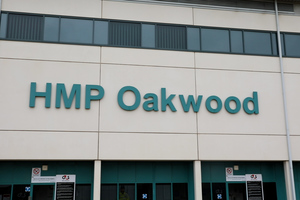Drive to get offenders drug-free and cut crime
New prison wings designed to get offenders clean will receive funding thanks to the government’s 10-year strategy to tackle drug-fuelled crime.

- £120 million to crack down on addiction and tackle drug-fuelled crime
- abstinence-led drug wings to be rolled out in prisons
- community drug testing boosted and extra support for prison leavers to prevent relapse
A £120 million drive, announced today (22 July 2022), will see the rollout of specialised wings across England and Wales which will treat drug addiction, including through abstinence, and then keep prisoners substance-free.
This tough approach will follow them through the prison gate, with offenders kept under closer control in the community with more drug testing, treatment and extra support to kick their addictions and keep our streets safer.
Ground-breaking new ‘problem-solving courts’ will also direct drug and alcohol abusers to tackle their addiction head-on or face tough consequences – including time in jail where necessary.
Illegal drug use costs the taxpayer nearly £22 billion each year, including NHS, prison and police costs.
Around half of all prisoners have a drug problem but those who get treatment are 19 percentage points less likely to reoffend.
Deputy Prime Minister, Lord Chancellor and Secretary of State for Justice, Dominic Raab said:
Drugs trap criminals in a destructive cycle of offending and prevents them from getting their lives back on track.
Our plan will get offenders into rehab earlier, get them off all drugs permanently and support prisoners once they’re released into the community. That will drive down reoffending, and make our streets safer.
As a result of the funding announced today, up to 18 abstinence-led ‘drug recovery wings’ and 100 ‘incentivised substance-free living units’ (ISFL units) will be rolled out in prisons by 2025.
Currently, addicted prisoners willing to turn their lives around are supported to get off illicit drugs at one of 25 ISFL units, where they receive regular drug testing, peer support, and incentives such as extra gym time for good progress.
The new system will see heroin addicts and other opiate abusers then move to the new drug recovery wings for six months of further intensive treatment, if needed. Here addicts will be supported to get clean from all drugs, including substitutes like methadone, through abstinence – overseen by up to 50 new specialists who will work with prisons.
These abstinent prisoners will then transition back through the incentivised units and into the general prison population, with continued support to stay drug-free.
The £120 million funding will also improve the support offenders have access to once they leave prison, to give them the best chance of staying on the straight and narrow. This includes:
- 50 ‘health and justice partnership co-ordinators’, who will work between prisons, probation and treatment providers, to ensure offenders’ treatment plans transfer smoothly from prison to the community.
- Up to 50 more probation staff will oversee drug testing for criminals serving a community sentence to keep them clean.
- The launch of two problem-solving court pilots in Teesside and Liverpool to combat drug- and alcohol-fuelled crime by giving offenders in the community a choice to either address their issues and engage with the help offered or face swift reprisals.
- Birmingham Magistrates’ Court will also pilot a problem-solving court for female offenders with complex needs, including substance misuse.
Sean Oliver, HMP Oakwood’s Director, said:
Abstinence can be key to get offenders off drugs and the start of turning their lives around.
The dedicated drug recovery support in our prison is already helping us provide prisoners with the wraparound support to ensure they’re drug free when released.
Noreen Oliver, founder and managing director of Burton Addiction Centre, said:
Drugs can have a devastating impact on families and communities. From the heartbroken parents asking a child to leave the family home, to the loved ones who sit and wait in fear for a knock on their door from police officers.
We have to be more ambitious in helping those caught in the revolving door of drugs and crime, by recognising that a significant number of prisoners were not criminals before they became addicts.
Making abstinence an integral part of the treatment system will give prisoners the chance and choice to live drug-free and crime-free lives and make our communities safer.
The funding is part of the government’s wider 10-year drugs plan which aims to tackle drugs and prevent crime, backed by nearly £900 million. This takes the government’s total investment on combating drugs over the next three years to £3 billion.
Notes to editors
- Initiatives funded by the £120 million include:
- Rolling out up to 18 new drug recovery wings and boosting the number of incentivised substance-free living units from 25 to 100
- Piloting substance misuse problem-solving courts in the community to combat drug and alcohol-fuelled crime
- A new drug-testing contract in prisons and the community, meaning a larger number of tests can be undertaken.
- Up to 50 drug strategy leads in all male category C and women’s prisons. They will drive the development and delivery of drug recovery wings and ISFLs locally.
- 50 health and justice partnership co-ordinators to cover all regions across England and Wales. These co-ordinators will liaise between prisons, probation, and local health partners so that prison leavers are supported to maintain and build on their progress towards abstinence.
- More laptops and licences so that prisoners can attend initial appointments with community treatment providers virtually prior to release
- The funding will also improve prison security measures such as anti-drone technology to tackle the supply of drugs into prisons and a new digital forensics laboratory to identify serious and organised criminals profiting from crime in prisons.
- A 2017 study found a 19 percentage-point reduction in the two-year rate of reoffending between those offenders who successfully completed drug or alcohol treatment and those who dropped out.